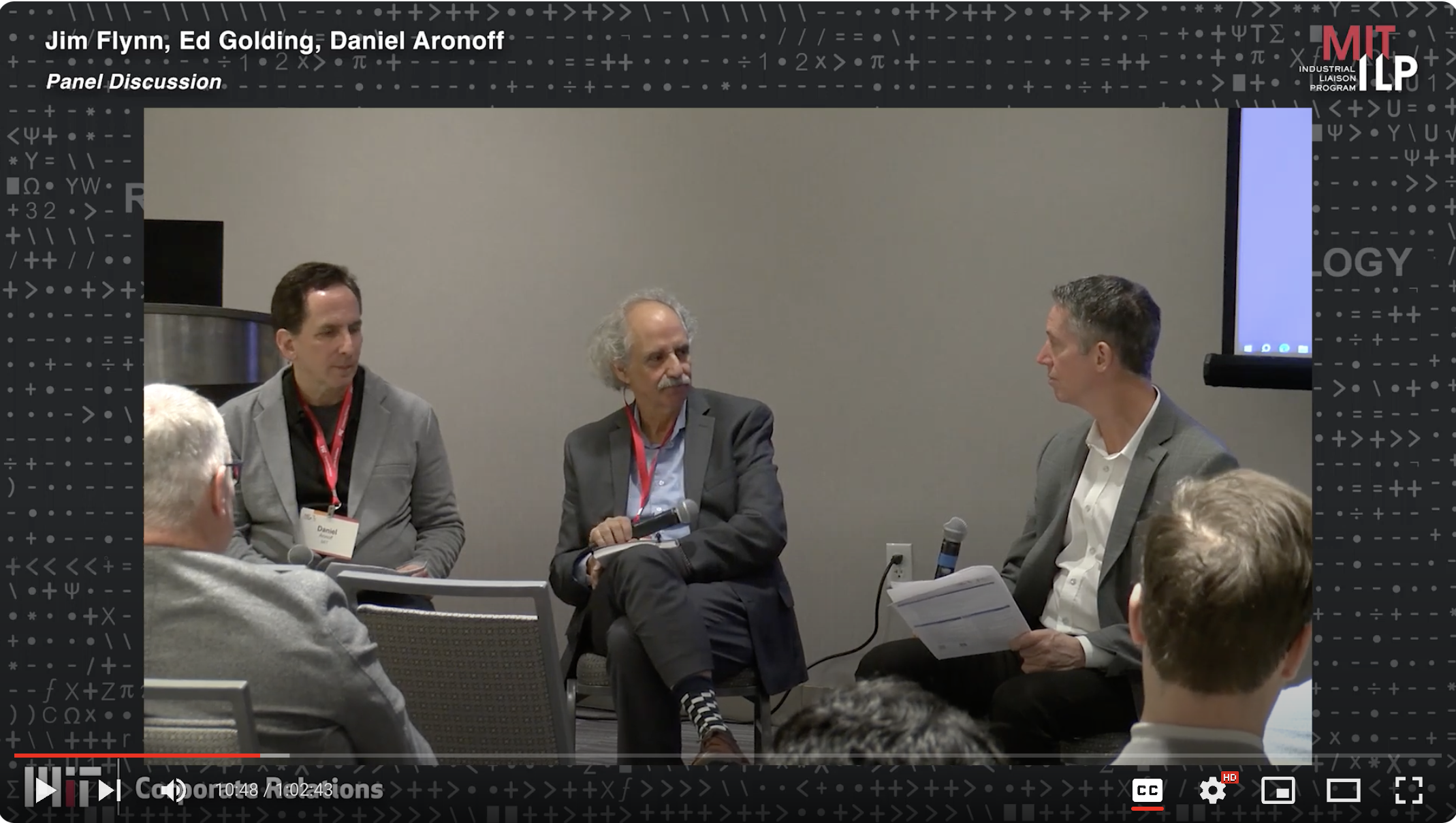the Decentralized Web
A report by the MIT Digital Currency Initiative and the Center for Civic Media
The Web is a key space for civic debate and the current battleground for protecting freedom of expression.
And yet, since its development, the Web has steadily evolved into an ecosystem of large, corporate-controlled mega-platforms which intermediate speech online. In many ways this has been a positive development; these platforms improved usability and enabled billions of people to publish and discover content without having to become experts on the Web’s intricate protocols.
But in other ways this development is alarming. Just a few large platforms drive most traffic to online news sources in the U.S., and thus have enormous influence over what sources of information the public consumes on a daily basis. The existence of these consolidated points of control is troubling for many reasons. A small number of stakeholders end up having outsized influence over the content the public can create and consume. This leads to problems ranging from censorship at the behest of national governments to more subtle, perhaps even unintentional, bias in the curation of content users see based on opaque, unaudited curation algorithms. The platforms that host our networked public sphere and inform us about the world are unelected, unaccountable, and often impossible to audit or oversee.
At the same time, there is growing excitement around the area of decentralized systems, which have grown in prominence over the past decade thanks to the popularity of the cryptocurrency Bitcoin. Bitcoin is a payment system that has no central points of control, and uses a novel peer-to-peer network protocol to agree on a distributed ledger of transactions, the blockchain. Bitcoin paints a picture of a world where untrusted networks of computers can coordinate to provide important infrastructure, like verifiable identity and distributed storage. Advocates of these decentralized systems propose related technology as the way forward to “re-decentralize” the Web, by shifting publishing and discovery out of the hands of a few corporations, and back into the hands of users. These types of code-based, structural interventions are appealing because in theory, they are less corruptible and resistant to corporate or political regulation. Surprisingly, low-level, decentralized systems don’t necessarily translate into decreased market consolidation around user-facing mega-platforms.
How decentralized systems can address mega-platform consolidation
In this report, we explore two important ways structurally decentralized systems could help address the risks of mega-platform consolidation: First, these systems can help users directly publish and discover content directly, without intermediaries, and thus without censorship. All of the systems we evaluate advertise censorship-resistance as a major benefit. Second, these systems could indirectly enable greater competition and user choice, by lowering the barrier to entry for new platforms. As it stands, it is difficult for users to switch between platforms (they must recreate all their data when moving to a new service) and most mega-platforms do not interoperate, so switching means leaving behind your social network. Some systems we evaluate directly address the issues of data portability and interoperability in an effort to support greater competition.
We offer case studies of the following decentralized publishing projects:
Freedom Box, a system for personal publishing
Diaspora, a federated social network
Mastodon, a federated Twitter-like service
Blockstack, a distributed system for online identity services
IPFS (Interplanetary File System), a distributed storage service with a proposed mechanism to incentivize resource sharing
Solid (Social Linked Data), a linked-data protocol that could act as a back-end for data sharing between social media networks
Appcoins, a digital currency framework that enables users to financially participate in ownership of platforms and protocols
Steemit, an online community that uses an appcoin to incentivize development and community participation in a social network
The rise of the Appcoin
Considering these projects as a whole, we found a robust and fertile community of experimenters developing promising software. Many of the projects in this report are working on deeply exciting new ideas. Easy to use, peer-to-peer distributed storage systems change the landscape for content censorship and archiving. Appcoins may transform how new projects are launched online, making it possible to fund open-source development teams focused on developing shared protocols instead of independent companies. There is also a renewed interest in creating interoperable standards and protocols that can cross platforms.
However, we have reason to doubt that these decentralized systems alone will address the problems of exclusion and bias caused by today’s mega-platforms. For example, distributed, censorship-resistant storage does not help address problems related to bias in curation algorithms – content that doesn’t appear at the top of your feed might as well be invisible, even if it’s technically accessible. And though censorship-resistance and decentralization are noble goals that will undoubtedly appeal to tech-savvy and politically inclined users, most users are not ideologically motivated and have no interest in shouldering the additional cost and responsibility of running these complex systems directly. They will want to engage with the Web through friendlier, third-party publishing platforms, and these platforms will suffer from the same forces that drive consolidation today.
It’s important to remember that today’s mega-platforms are built on top of the Web’s already distributed and open protocols. The real issue to address is this natural tendency towards market consolidation. Underlying these concerns is the predominant business model for platforms on the Web – user-targeted advertising. Advertising based business models encourage the consolidation and the hoarding of user views and data, driving platforms to become ever larger.
The challenges decentralized systems face
User and developer adoption. Technical feasibility alone does not guarantee the sort of widespread adoption necessary to build a useful social network. Some of the more mature tools developed in this space have faced serious difficulties in attracting a permanent user base, and the problems those platforms suffer from may hinder the growth of new systems as well. Social networks, in particular, are difficult to bootstrap due to network effects. We generally join social networks because our friends are already there. Systems like Steemit and Diaspora are currently incompatible with existing social networks, planning to supersede existing communities like Reddit and Facebook, rather than integrate with them. Taking a competitive, rather than complementary, position in the market creates a difficult barrier to entry for new projects. Similarly, interoperable protocols require adoption at the developer level. Solid, which hopes to bridge between existing and novel social networks, faces a serious adoption challenge: Why should developers choose to switch to Solid’s new data model, and what's the incentive for Facebook to make their data interoperable without legal requirements forcing them to do so?
Security. Another major issue is security. “Decentralized” networks generally means anyone can join, which implies these systems have to take strong precautions to enforce security, usually by pushing the responsibility of security to users in the form of managing public key cryptography. It is extremely difficult to develop software that is both cryptographically secure and easy to use. Most of these systems, like IPFS and Blockstack, do not yet have a good story for how users will manage their private cryptographic keys and gain a good mental model of complex security protocols. As companies like Signal, an encrypted messaging service, have recently demonstrated, this is not impossible to achieve, but it requires an intense focus on usability that we did not see in many of the tools we review in this report.
Monetization and incentives. Given that user data is so important for monetizing these platforms, there is little incentive for the mega-platforms to adopt interoperable protocols – they would rather own all the data. Similarly, content that is viewed and clicked on the most generates the most advertising revenue, so mega-platforms have an incentive to prioritize viral, attention-grabbing or feel-good content. Steemit offers a fascinating alternative model to prioritizing and monetizing content. However, it replaces opacity with a semi-transparent free market model that concentrates power in a few hands and, if not carefully crafted, might even incentivize more clickbait. Designing robust reward mechanisms for community-governed content is still an open problem, but if solved, this could be integral to placing curation control in the hands of a community.
Resisting market consolidation. Platforms benefit from economies of scale in multiple ways – it’s cheaper to acquire resources like storage and servers in bulk and as platforms become larger they become more useful as a social network and usually, more profitable. Even in decentralized systems like Bitcoin, there has been a natural market consolidation in the form of large mining pools. This type of consolidation into a few super-participants might be inevitable due to economies of scale. We are increasingly persuaded that this isn't necessarily a bad thing, and that a more realistic goal might be the development of a robust, competitive marketplace that offers a range of ground rules for online speech, rather than a return to a purely peer-to-peer architecture for communication online.
Recommendations
We advise investors–whether motivated by civic or fiscal concerns–both to watch this space closely and to advocate for the pre-conditions that we believe will enable a healthier marketplace for online publishing. A precondition for the success of these distributed platforms is a shift towards user-controlled data, the ownership of a user’s social graph and her intellectual property created online. It will be difficult for new platforms to develop without widespread support for efforts towards data portability and rights over data ownership. Data portability also enables new models for aggregation.
Small, thoughtfully curated news sources will be made more powerful by having access to the user data currently locked inside mega-platforms, but right now, federated clients that interoperate between different platforms are borderline illegal – fixing this may require adjusting overly broad regulations, like the Digital Millennium Copyright Act. We believe that these user-controlled data rights are essential to develop a more robust market and allow new efforts to emerge from existing communities. Though individual users might not directly care about or understand these rights, their adoption will free developers to create applications that leverage users’ existing data, so that they can provide compelling, interesting new experiences, even with a small user base.
In envisioning a marketplace for open speech platforms that support more generative and censorship-resistant discussions, we recommend focusing on supporting existing efforts that provide alternatives to Facebook’s opaque curation and ranking. These alternatives might look more like Reddit's sub-communities, with different rule sets to enable different types of conversation, overseen and administered by members of the community with a system for due process when contentious issues arise.
Funding developers directly to create a diverse ecosystem of publishing platforms and curation websites is another place to make a difference. In particular, foundations are in an excellent place to fund the development of user-friendly software to implement common security practices that are common across many applications. An example of this is Let’s Encrypt, which makes using secure HTTP (HTTPS) easier for small website administrators. Most small platforms do not have the resources to directly hire experts in usability and security.
Another fascinating space to watch and explore is that of Appcoins. Recently there has been a dramatic upsurge in the adoption of appcoins as a mechanism for funding new projects and platforms. Appcoins potentially provide a way to circumvent the existing open-source or VC-funded software development models to create systems where users collectively own their data. Creating an alternative business model to advertising could end up pushing the markets to create entirely new, different types of applications than the ones we’ve seen so far, which mainly rely on user data and views. New funding models means smaller projects could more easily bootstrap small, personalized communities. However, this space also has a lot of potential for scams, and it might be unreasonable to expect users to manage a financial stake in many different networks.
Media
Researchers and Collaborators
Archived Project - No one is actively working on this project






